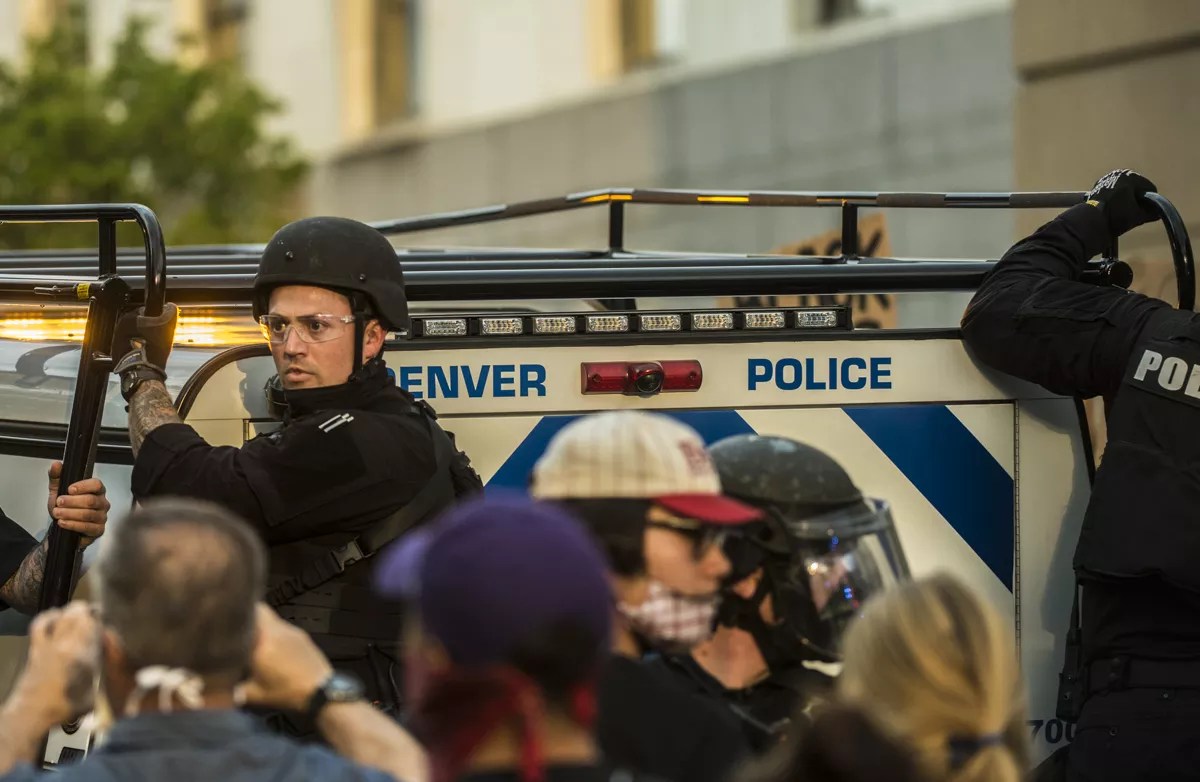
Evan Semon Photography

Audio By Carbonatix
As she watched law enforcement officers caught on camera using “less-lethal” weapons on protesters in Denver, Julie Gonzales, a state senator who represents downtown and parts of north and west Denver, was reminded of times past.
“Denver deployed riot police against students back in 1969 with the West High School Blowouts. And police utilized tear gas against striking carnation workers in Brighton in the ’60s as well,” says Gonzales.
During demonstrations that started May 28 over the death of George Floyd in Minneapolis, “I had seen many of the videos of protesters being pepper-sprayed, of protesters being hit with rubber bullets,” she adds. “And I was really encouraged when several people who not only live in Denver, but live in Senate District 34, brought forward a lawsuit to really challenge those actions and to say that type of conduct is not acceptable.”
That class-action lawsuit has already resulted in a major ruling: Late on June 5, Judge R. Brooke Jackson of the U.S. District Court of Colorado issued a temporary restraining order placing clear restrictions on when and how law enforcement can use “less-lethal” munitions against protesters in Denver. Now, a key section from that federal court order is close to becoming law for all of Colorado.
Gonzales added an amendment to Senate Bill 217, a sweeping bipartisan police reform bill introduced at the Colorado Legislature, that comes almost verbatim from Jackson’s ruling.
If SB 217 passes – and it will almost definitely pass, since it has been approved by the Senate and just made it out of the House Finance committee – it will be illegal for law enforcement in Colorado to fire less-lethal rounds at the head, pelvis or back of those present at protests. Law enforcement officers will also be prohibited from firing less-lethal rounds indiscriminantly into a crowd.
And law enforcement will now have to issue an order to disperse, then allow time and space for protesters to comply (and repeat the order if it appears the crowd didn’t hear the first one), before using chemical irritants like tear gas and pepper spray.
“That’s what I’m doing to show solidarity with protesters,” says Gonzales. “I can’t march every day because I’m here at the Capitol. But I’m trying to do what I can here to ensure that protesters’ rights are protected.”
All of those stipulations are currently in place for law enforcement in Denver, per Jackson’s order. But that is only temporary.
Denver Police Chief Paul Pazen, who has promised to re-evaluate all policing protocols in Denver, says that officers with the Denver Police Department will abide by the terms of the temporary restraining order.
“We’ve seen peaceful protests since the order went down,” says Milo Schwab, the lead attorney behind the lawsuit. “The following day, I saw a lot of posts on Twitter and Facebook, saying, ‘I’m so excited to be able to go to the protest without wearing a helmet.’ That’s all you need to know. That moved me. It was very powerful. It was a very powerful thing to read over and over again.”
In addition to implementing the “less-lethal” rules, SB 217 would:
• Mandate body cameras. The bill requires officers to wear body cameras and record interactions with members of the public when there is a potential for using force, and for footage of an incident of misconduct to be released to the public within 21 days. The bill includes privacy provisions for victims, witnesses and juveniles, or when footage contains highly personal circumstances such as nudity, and it ensures that the victim of the officer misconduct and the victim’s family receive the footage 24 hours prior to public release.
• Require public reporting on policing. All law enforcement agencies would be required to track and publicly report data for any contacts they initiate for law enforcement purposes. That data would include any use of force (both the type and severity), civilian searches, forced entries into homes, the unholstering and discharge of a firearm, and demographic information on race, ethnicity, sex and age of the person contacted.
• Rein in use of deadly force by officers. It would bring Colorado law in line with Supreme Court precedent holding that an officer may only use deadly force, including on people who are fleeing the police, when there is an imminent risk of danger to human life. It also repeals an officer’s authority to use dangerous tactics like the chokehold.
• Prevent the rehiring of bad actors. If an officer is convicted of, or pleads guilty to, any inappropriate use of physical force, their POST certification would be revoked. Officers who are found untruthful, terminated for cause or decertified would be listed in a public database to prevent them from moving from one agency to another.
• Hold individual officers liable for their actions. It would allow victims of police misconduct to bring a lawsuit for the violation of their constitutional rights within a two-year statute of limitations, and officers convicted of misconduct would no longer be shielded by the doctrine of qualified immunity. It would also hold officers accountable for failing to intervene during another officer’s inappropriate use of physical force.